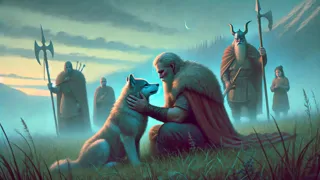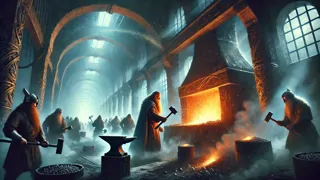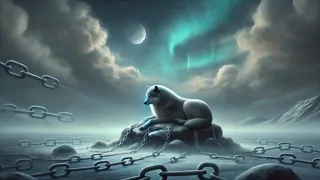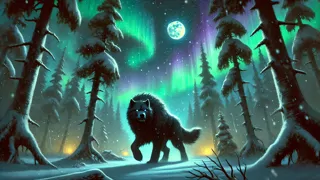Introduction
Beneath the swirling auroras and bone-chilling winds of ancient Iceland, where the land lay stitched together by black lava fields and snow-draped forests, a story echoed across the ages—a tale older than the memory of men, whispered by the gods themselves around the golden halls of Asgard. The sky shimmered with secrets, the ground trembled with portents, for the very fabric of fate was said to have been woven into a monstrous wolf’s sinews: Fenrir, born of Loki’s wild blood and Angrboda’s shadowed lineage. From the moment his eyes blinked open in a den of frost and gloom, his destiny was tangled with that of the gods.
The Aesir watched him grow—first as a whelp, all soft paws and curiosity, then as a beast whose breath steamed in clouds and whose step cracked stones. Yet it wasn’t size that drew Odin’s wary gaze, but prophecy. For the Norns, those veiled weavers of doom, had spoken: Fenrir would one day break his bonds, and in the twilight of the gods—Ragnarok—he would devour Odin himself, sundering the world. This prophecy wound itself around the gods’ hearts like a bitter vine. Suspicion turned to fear, fear to plotting, and from plotting to a web of deceit so intricate it would scar the hearts of gods and monsters alike.
In the meadows and forests of Asgard, young Fenrir ran with Tyr, god of war and honor, who alone dared feed him and meet his gaze without flinching. But the wolf’s presence became a burden too heavy to bear. Whispers of his growing power wound through Asgard like winter winds, chilling the golden halls. Odin’s wisdom saw no path to peace, only to postponement, and so the gods devised a plan—one that would test their cunning, courage, and the bonds of trust between wolf and man. It was a story of innocence lost and trust shattered, of gods who feared their own futures, and a wolf who trusted too well.
This is the binding of Fenrir—a saga of fate’s iron grip and the sorrow it leaves in its wake.
A Beast Among Gods: Fenrir’s Growth and the Seeds of Fear
As dawn stretched pale fingers across the endless meadows of Asgard, the gods gathered atop a rise overlooking the land. Fenrir, then barely larger than a hound, tumbled in the grass at Tyr’s feet. His fur was the color of midnight, but his eyes—strange, fierce, and full of an intelligence that unsettled even the bravest among the Aesir—never left the gods’ faces. Odin, all-seeing and grave, watched with a mixture of curiosity and dread. It was he who had summoned the Norns to question Fenrir’s fate, and it was he who bore the burden of their answer: that the wolf would be their doom.

In the beginning, Fenrir’s days were simple. He chased after golden-haired Sif through wildflowers, nipped at the edges of Thor’s thunderous laughter, and curled close to Tyr by the fireside. Only Tyr, the god whose honor was as unbreakable as steel, dared approach him without caution. The others—Frigg, Freyja, even Loki, Fenrir’s own father—kept their distance, their eyes narrowed with unease. Loki’s visits were rare and wild, filled with cryptic smiles and riddles that left Fenrir with more questions than answers. Sometimes, Fenrir would catch glimpses of Odin’s ravens, Huginn and Muninn, circling high above, always watching.
But the wolf grew swiftly—far beyond what nature allowed. With each season, his body stretched and thickened, muscles rippling beneath his pelt. His voice, once playful, became a deep-throated rumble that made branches tremble and deer scatter. Soon, tales of Fenrir’s size and strength drifted beyond Asgard’s walls, carried on the wind to Jotunheim and Midgard. The gods’ concern sharpened; what began as an uneasy truce with the wolf soon felt like harboring a storm at their very hearth.
At feasts in Valhalla, Fenrir’s absence was palpable. The gods tried to forget the wolf lurking beyond their walls, but each time thunder echoed or a shadow crossed the moon, their thoughts returned to the prophecy. Odin, ever wise, counseled patience—yet even he could not ignore the weight that pressed on their hearts. Freyja, goddess of love and fate, wept silver tears as she watched Tyr teach Fenrir the words of men. She saw the wolf’s gentle trust, the way he nuzzled Tyr’s palm, unaware of the gods’ growing fear.
The turning point came on a night shrouded in frost. Fenrir’s howl split the darkness—a call so powerful that the very stars seemed to tremble. Odin saw omens in the frost patterns, in the way the auroras flared in the northern sky. Gathering the Aesir in his hall, he spoke: “We cannot change fate, but we can delay it. Let us bind Fenrir—not to kill, but to contain until Ragnarok comes.”
The gods set about forging a chain—Laeding—of the hardest iron. They approached Fenrir, their voices gentle and cajoling, and proposed a game. “Let us see if your strength can break what no other can,” they said. Fenrir, trusting and proud, agreed. With a laugh, he allowed the gods to wind the iron links around his limbs. With a shake—no more effort than a hound breaking free from a leash—Fenrir snapped Laeding as if it were twine.
Unnerved but undeterred, the gods forged Dromi, twice as thick and heavy. Again, they pleaded with Fenrir to test his might. Again, Fenrir obliged, his golden eyes bright with excitement. The chain lasted only moments before it, too, lay shattered at his feet. The gods feigned delight, but in their hearts, fear deepened into desperation. The wolf’s strength was growing unchecked, and their time was running out.
It was then that Odin sent for the dwarves—the master craftsmen of Svartalfheim, who could forge what gods and men could not. Odin traveled through icy mists and mountain tunnels to reach their hidden halls. In return for payment in gold and secrets, the dwarves agreed to fashion a chain unlike any other. They named it Gleipnir—a ribbon smooth as silk, light as a feather, yet stronger than any iron. It was spun from six impossible things: the sound of a cat’s footfall, the beard of a woman, the roots of a mountain, the sinews of a bear, the breath of a fish, and the spittle of a bird.
When Odin returned to Asgard bearing Gleipnir, it shimmered in his hands like moonlight on ice. The gods marveled—and shuddered—for they knew this was their last chance. The plan was set: they would lead Fenrir to a remote lake on the island of Lyngvi, far from prying eyes and sympathetic hearts. There, they would test his trust once more, and this time, they would not let him go.
The Forging of Gleipnir: An Impossible Chain and a Sorrowful Pact
The secret halls of Svartalfheim echoed with the hammering of dwarven forges. Odin’s shadow loomed in the flickering light as he watched the master-smiths spin the impossible: Gleipnir. Each element was acquired through guile or gift—cat’s footfall, beard of woman, mountain root—woven into a ribbon so smooth it defied belief. The dwarves worked with haste and care, knowing the fate of gods and monsters balanced on their skill. When they finished, Gleipnir shimmered like spun silver and weighed less than a feather, yet in its weave was the unbreakable will of the earth itself.

Back in Asgard, Odin and his kin rehearsed their ruse. It must seem a jest—a challenge worthy of Fenrir’s pride. Only Tyr remained silent, dread tightening in his chest. He alone had looked into Fenrir’s eyes and seen not a beast but a friend; he alone understood the cost of what was to come.
When the appointed day dawned, winter’s breath stung the gods as they led Fenrir to the island of Lyngvi. The lake was mirror-still, reflecting jagged peaks and a sky bruised with storm. Fenrir padded at Tyr’s side, head high but wary. He sensed the gods’ tension, their whispered plans curling like mist behind him.
Odin presented Gleipnir with a flourish. “See, Fenrir,” he called, “this chain is so light and slender—surely you can break it as you did the others?” The wolf eyed the ribbon with suspicion. Something in its shimmer unsettled him; some whisper in its weave reminded him of old magic and bitter endings. He turned to Tyr. “I’ll not be bound unless one of you swears to keep me safe. If this is trickery, I’ll not forgive it.”
The gods hesitated. Only Tyr stepped forward. He placed his hand gently in Fenrir’s jaws—a pledge, wordless but unbreakable. His heart ached with betrayal, yet he would not let fear guide his hand. Fenrir looked into Tyr’s eyes and found only sorrow.
The gods wound Gleipnir around Fenrir’s legs and neck. Its touch was cool as moonlight, soft as hope. For a moment, nothing happened. Then Fenrir strained against the ribbon—once, twice. But Gleipnir did not yield. The wolf’s muscles rippled; he threw himself backward with all his might. The earth shook, trees toppled, but Gleipnir held fast.
Realization dawned in Fenrir’s eyes—betrayal burning hotter than rage. He snapped his jaws shut in grief and fury, shearing off Tyr’s hand at the wrist. Blood spattered across the snow. Tyr fell to his knees but did not cry out; his sacrifice was silent, heavy as the sorrow that settled over the gods.
Bound at last, Fenrir howled—a sound that split the sky and echoed through all the worlds. The gods recoiled at its pain. They drove a sword between Fenrir’s jaws to keep them open; blood and spittle frothed from his mouth and stained the ground. The lake’s waters churned with his rage. Odin watched with a heart turned to stone. The deed was done—fate delayed, but not undone.
Betrayal and Prophecy: The Quiet Years and the Shadow of Ragnarok
With Fenrir bound upon the island of Lyngvi, a strange quiet settled over Asgard. The gods resumed their feasts and hunts, but laughter never reached the same heights. Tyr learned to wield sword and shield with one hand, his face marked not by pain but by a quiet grief. His absence from the wolf’s side was a wound deeper than any blade could carve. The bond of trust—the one thing that might have changed fate—was broken.

Fenrir raged against his bonds for days and nights. His howls shivered through the roots of Yggdrasil and bled into dreams across the Nine Realms. Yet as the years crept by, rage ebbed into sorrow, sorrow into silence. The wolf’s golden eyes watched the skies for signs: would Tyr ever return? Would Loki come to plead his case? But no god dared approach Lyngvi. The island became a place of fear—where even ravens would not land and no living thing dared linger.
In Asgard, Odin brooded over his sacrifice. He had gained time, but at what cost? He sent his ravens to watch over Lyngvi, to mark Fenrir’s slow decay—muscles thinning, fur graying, yet eyes still burning with prophecy. Freyja wept for Tyr’s pain; Thor cursed the chain that even Mjolnir could not break. Loki vanished from their halls, his guilt unspoken but heavy as lead.
Years slipped into centuries. Mortals built altars to the gods, unaware that their fates were tied to a suffering wolf on a barren island. Yet across Midgard, tales spread: stories of a monstrous howling that foretold storms, of dreams haunted by golden eyes and broken trust. The world seemed to hold its breath.
Yet fate is never truly delayed—only held at bay by threads thin as hope. The Norns still spun their loom in the roots of Yggdrasil. Their whispers grew louder as Ragnarok approached: when the chain breaks and Fenrir runs free, he will set in motion the end of all things—the fall of gods, the shattering of the world.
But the story does not end with fear alone. In time, a new generation of gods and mortals would ponder Fenrir’s tale. Was he only a monster? Or was he a victim of prophecy—a beast who loved and trusted, betrayed by those he called kin? The question rippled outward, a warning and a lament.
In the final hours, when stars fade and Bifrost shatters, Fenrir will break his bonds. He will run through the ruins of Asgard, jaws wide to swallow Odin and darken the sun. But behind every act of rage lies a wound—and behind every prophecy, a choice. The gods delayed their fate, but not without paying dearly in trust and blood.
Conclusion
The tale of Fenrir’s binding lingers like frost on ancient stone—a reminder that even gods must pay for their choices. In their fear of prophecy, the Aesir traded honor for delay and broke a bond that could never be mended. Tyr’s sacrifice became legend; Fenrir’s howl echoed through every long winter night, a song of loss and longing. Yet within this tragedy lies a question for every generation: are we prisoners of fate, or do our choices shape what is to come?
For in every act of betrayal there is a spark—of love, of fear, of hope that things might yet change. The story endures not only as a warning but as a testament to trust, sorrow, and the price of trying to outwit destiny. As Ragnarok looms ever closer in the sagas, so too does the memory of a wolf who loved and lost—a symbol for all who walk uncertain paths beneath northern skies.


















